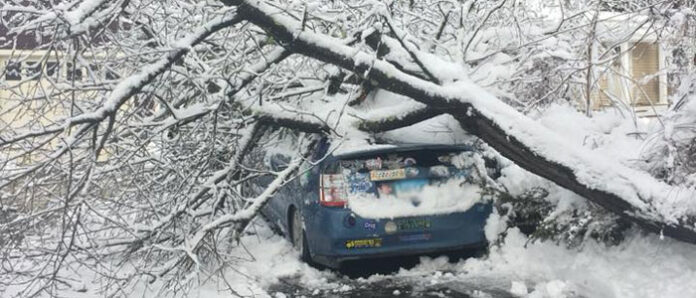Your home could be at high risk for frozen pipes when temperatures are extremely cold but then thaw quickly.
How to notice and take action
It’s so important that you pay attention and do everything possible to avoid frozen pipes when extreme cold weather is forecast for your area. These claims happen extremely quickly and can cause millions of dollars in damages. Please review our tips below to help you recognize and take action if a pipe has frozen or burst. If you are away from home or have a secondary residence in an area where temperatures are expected to fall below freezing, have someone looking after your home perform these steps at least twice a day.
How to check your home for signs of burst or frozen pipes
- Inspect the exterior of your home. Walk around your property and see whether water has accumulated anywhere it should not. Examine your yard for warning signs such as sinkholes.
- Inspect the interior of your home. Walk through your entire house, especially rooms such as bathrooms, kitchens and laundry rooms and those below and adjacent to them. Check for actively dripping water and signs that water is leaking out of sight, such as damp drywall, rings on the ceiling, unusual odors or bubbling, banging, clanking or whistling noises. Examine any exposed pipes, looking for frost, condensation or bulging areas.
- Check your plumbing. When you have completed the steps above, turn on the faucets (both hot and cold) and flush the toilets to ensure they are working and that the water has no discoloration or odor. An open faucet that produces a slow trickle—or no water at all—is a good reason to suspect that a pipe has frozen. Also check the water meter; if it shows flow when all water fixtures are off, it is likely that a pipe has burst.
- Inspect the unheated areas of your home. Water supply lines in unheated areas such as unfinished basements, crawl spaces, attics and garages are susceptible to freezing. Check for leaks, pooled water, and the other warning signs listed above in these spaces as well.
How to take action if a pipe has burst:
If you notice any of the warning signs listed above, shut off the water supply to the affected area of the house—or to the entire home, if necessary—and leave faucets open. You should then immediately call your plumber.
Last-minute steps to help avoid burst or frozen pipes
-
- If you are going to be away for an extended period of time, consider shutting off your home’s water supply.
- Ensure your heat is set to a minimum of 21°C. When it is very cold, setting the heat below this threshold may not be enough to prevent pipes from freezing and bursting, especially if your home is unoccupied.
- Open vanity and cabinet doors so warm air can reach pipes more easily.
Please contact an Aaxel broker for Insurance advice!





